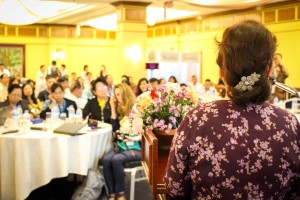Myanmar launches a Civil Society Alliance for Scaling Up Nutrition
Civil Society, Government, the United Nations and Donor Community joined together in Yangon, Myanmar on the 17th February to launch the Scaling Up Nutrition Civil Society Alliance (SUN CSA) in Myanmar. Nearly 40 civil society organisations pledged to join the movement to eradicate malnutrition in…
Civil Society, Government, the United Nations and Donor Community joined together in Yangon, Myanmar on the 17th February to launch the Scaling Up Nutrition Civil Society Alliance (SUN CSA) in Myanmar. Nearly 40 civil society organisations pledged to join the movement to eradicate malnutrition in the country.
Over 80 participants present heard about the SUN CSA’s ambition to help fulfill the National Plan of Action for Food and Nutrition for the country, with the aim of reducing child stunting from 35 per cent to 30 per cent; and the number of anaemic women from 70 per cent to 60 per cent by 2016, among other goals.
The Government of Myanmar signed up to the SUN movement in May 2013, demonstrating their commitment to deliver sustainable solutions in order to address nutrition problems in Myanmar. Dr Yin Thandar Lwin, Deputy Director General of the Department of Health, Ministry of Health gave a keynote speech reaffirming Myanmar’s commitment to scaling up nutrition. So far the SUN CSA has garnered the committed support of 15 members, including the National Nutrition Committee from the Myanmar Ministry of Health.
“As individual organisations serving mothers and children around the country, we have not been able to tackle the prevalence of stunting, wasting and anaemia in Myanmar. A collective effort across all civil society organisations is needed if we are to achieve our goal of eradicating malnutrition here,” said Dr San San Myint, Programme Manager for the SUN CSA.
Some progress has been made in the Southeast Asian country – the average annual reduction in stunting in children is reported to be 1.8% while the average annual reduction in anaemia amongst women of reproductive age is 3.7%. However, to reach global targets agreed by 96 signatories at the World Health Assembly, Myanmar still has some ways to go.
Actions needed to achieve these goals were discussed at the Nutrition Roundtable held after the SUN CSA launch. This served as an opportunity to launch the Global Nutrition Report in Myanmar 2014. At the roundtable discussion, nutrition experts came together to discuss the barriers and opportunities associated with tackling malnutrition in Myanmar.
According to panel experts, the key actions needed are good, consistent and measurable data and an integrated approach to nutrition. As good nutrition programmes are best implemented in conjunction with key government and non-government programmes, such as agriculture, health, social protection and education, panel members say the onus is on all development stakeholders to contribute to national outcomes and encourage nutrition to be prioritized at the highest political levels.
Dr San San Myint said: “That’s the role of the SUN CSA – to bring all development stakeholders together, give them a voice, and jointly contribute to achieving better nutrition outcomes for all mothers and children in Myanmar. We are calling for more civil society organisations to be a ray of the SUN CSA.”
Read about the event in the Myanmar Times here.
(Written by Lynette Lim, Communications Manager, Save the Children in Myanmar)
